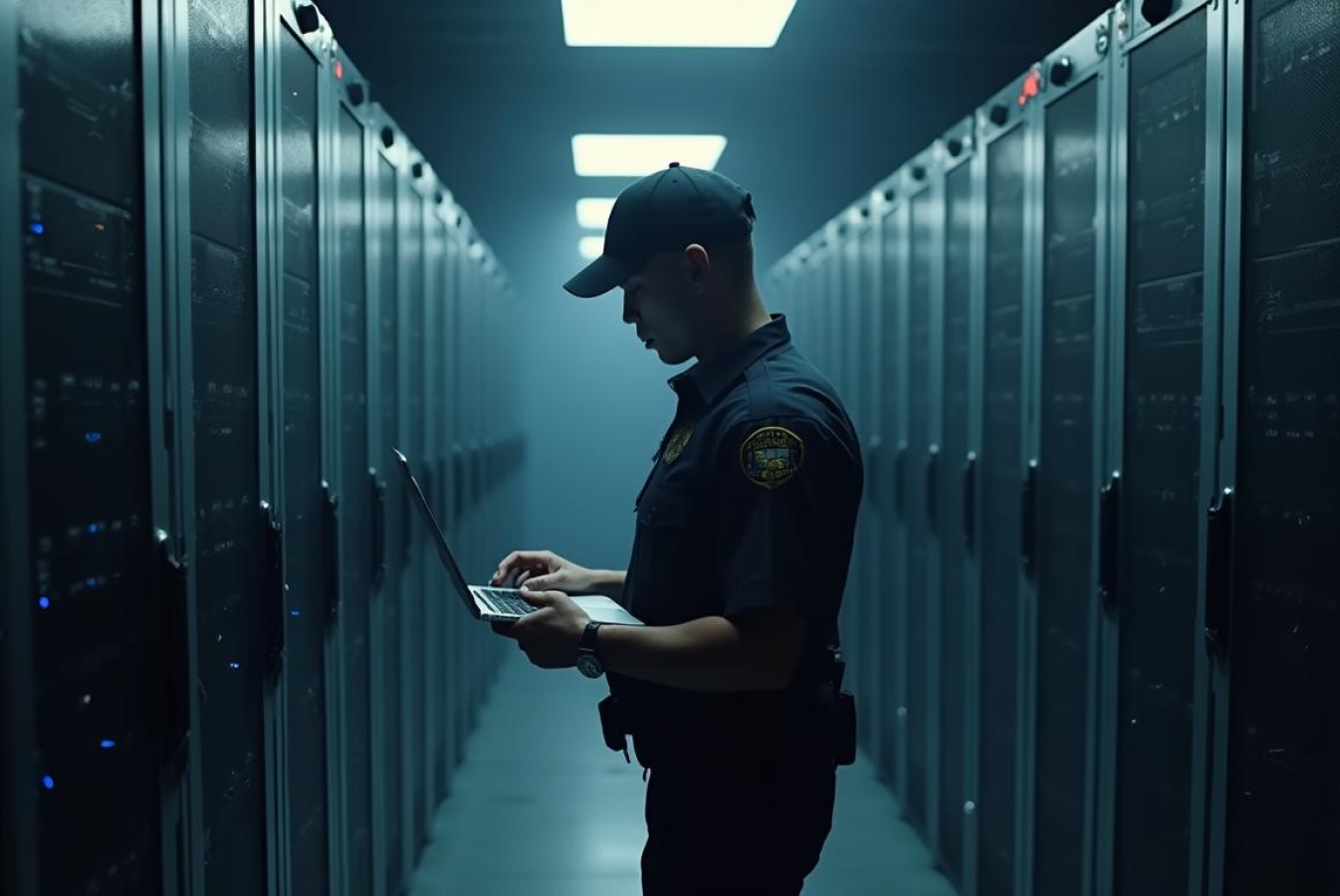On-Premises vs. Cloud: Which one is Better for your Law Enforcement Agency?
by Umer Ahmed, Last updated: July 2, 2025, ref:

In today’s fast-paced, high-stakes world of law enforcement, making the wrong technology decision can lead to costly mistakes. If your agency is caught between choosing on-premises systems or cloud-based solutions, you're not alone.
Every day, law enforcement leaders are tasked with balancing security, efficiency, and costs while adapting to the ever-evolving technological landscape.
Here’s the painful truth: both on-premises and cloud solutions come with their own complexities, and one wrong move could mean compromised data, unnecessary costs, or worse—system failures during critical moments.
So, how can you determine which option is the right fit for your department? Let’s break down the pros and cons of both options and help you make an informed decision that aligns with your agency’s needs.
The Pressure to Make the Right Choice
For law enforcement agencies, the pressure to ensure mission-critical systems are reliable, secure, and cost-effective has never been greater. From managing sensitive criminal records to ensuring real-time data access for officers in the field, every decision made around technology infrastructure impacts overall performance.
A wrong choice between on-premises and cloud systems can have far-reaching consequences—ranging from data breaches to inefficient workflows.
Imagine this: A police officer in the field needs immediate access to a suspect's criminal history. They attempt to access the database, but that officer loses precious minutes because the department's on-premises system is experiencing downtime. In those minutes, a suspect could slip away, or worse, a dangerous situation could escalate.
On the flip side, moving to the cloud sounds like a dream. But what if your department’s data is vulnerable to breaches, or you lose access to crucial files because your internet connection fails?
So, which option ensures you don't find yourself in a crisis? Let's explore both in depth.
The Hidden Risks of Both Options
While on-premises systems offer greater control, they require significant investment in hardware, maintenance, and skilled IT personnel. This can lead to long-term costs often overlooked during the initial decision-making process.
On-Premises Systems: The Cost and Complexity
On-premises software and infrastructure have long been the standard for law enforcement agencies. It’s easy to see why. With on-premises systems, your department controls all hardware and data. No third-party provider holds your sensitive records; you don’t have to worry about external access points. For some, this sense of control is crucial for peace of mind.
However, this comes with a significant set of challenges:
High Upfront Costs
Setting up on-premises infrastructure requires significant investment in hardware, servers, and storage devices. For agencies with tight budgets, this upfront cost can be prohibitive.
Maintenance and Downtime
Your IT team is responsible for ensuring the system runs smoothly. But what happens when there’s a server failure, a software bug, or a hardware issue? These problems often require costly repairs or downtime, impacting your ability to serve the public efficiently.
Scalability Issues
As your agency grows, your system will need to scale. This can mean more servers, storage, and personnel to maintain everything. The costs and logistical hurdles can quickly pile up.
Data Security Risks
While on-premises systems allow for more direct control over security, it also means your agency is fully responsible for safeguarding its data. The risk of a data breach, whether from internal or external sources, is something you need to monitor constantly.
Cloud Solutions: The Dream that Needs a Second Look
Cloud-based solutions are often marketed as the ultimate, cost-effective, and efficient choice. They promise access to data anywhere, seamless scalability, and reduced upfront investment. But like all shiny new tech, there’s more beneath the surface.
Internet Dependency
The cloud can’t function without a reliable internet connection. In a law enforcement scenario, an internet outage could be catastrophic, especially if field officers rely on cloud-based systems to access real-time data.
Security Concerns
While cloud providers often invest in top-tier security measures, data breaches are still possible. The centralization of sensitive data in the cloud raises concerns about unauthorized access and the safety of personal information. According to a report, 44% of cloud organizations have experienced a data breach.
Long-Term Costs
Although the cloud offers lower initial investment costs, subscription fees can increase. Depending on your agency’s data usage, those costs might become difficult to predict, leading to unexpected budget spikes.
Vendor Lock-in
Relying on a cloud provider means you're subject to their policies, uptime schedules, and support. If the provider experiences downtime or changes terms of service, your agency could face interruptions or unexpected charges.
The Pros of On-Premises and Cloud Solutions
Both on-premises and cloud solutions bring distinct advantages to the table, offering unique opportunities to enhance law enforcement operations. By understanding the benefits of each, agencies can identify how these technologies align with their goals and challenges.
On-Premises Systems: Security, Control, and Customization
On-premises systems provide agencies with unmatched control over their data and infrastructure. By hosting systems locally, agencies can ensure that sensitive information remains within their physical and digital control, making it ideal for highly sensitive applications.
- Physical Security: Agencies can control physical access to servers, reducing risks associated with third-party storage facilities.
- Reliability: On-premises systems operate independently of external internet connections, providing consistent uptime during critical situations.
- Customizability: Systems can be tailored to integrate with legacy hardware, proprietary software, and existing workflows, ensuring seamless operations.
- Long-Term Cost Savings: While initial investments are high, on-premises solutions avoid recurring subscription fees and provide cost predictability over time.
Cloud Solutions: Flexibility, Scalability, and Innovation
Cloud solutions excel in their ability to adapt to changing needs, offering scalability and accessibility that are particularly valuable for growing agencies or those with dynamic operational requirements.
- Scalability: Cloud systems can instantly expand storage, processing power, or applications as agency needs grow, without requiring additional hardware.
- Remote Accessibility: Officers can access critical data and applications from any location, enhancing field operations and decision-making.
- Reduced Maintenance: The provider manages updates, security patches, and system maintenance, reducing the burden on IT staff.
- Advanced Tools: Cloud platforms often offer cutting-edge technologies, such as AI-driven analytics and mobile integration, improving efficiency and situational awareness.
Finding the Right Balance for Your Agency
So, where does that leave us? Is there a middle ground that allows law enforcement agencies to enjoy the benefits of both on-premises and cloud solutions? The answer is a resounding yes.
A hybrid approach can offer the best of both worlds, allowing your agency to benefit from the security and control of on-premises systems while leveraging the flexibility and cost-effectiveness of the cloud. Here’s how:
Use On-Premises for Sensitive Data
An on-premises solution might be ideal for highly sensitive data, such as criminal records, evidence logs, and investigative files. This ensures complete control over security while mitigating the risk of cyber threats and data breaches.
Leverage Cloud for Non-Critical Operations
Cloud solutions can be used for non-critical applications, such as administrative tools, training, or less sensitive case management systems. This reduces the overall strain on your on-premises infrastructure and gives you access to the cloud's scalability and flexibility.
Hybrid Cloud Solutions
Many agencies are exploring hybrid cloud options, where critical data is stored on-premises. However, other functions, like real-time analytics, video storage, or mobile access for officers, are moved to the cloud. This strategy offers a balance between control and flexibility.
Consider Compliance and Data Sovereignty
It’s crucial to assess any compliance requirements your agency must adhere to, such as data protection laws and regulations. Depending on your jurisdiction, certain data may need to remain within your country or region, which could impact your decision.
Key Takeaways
-
Both On-Premises and Cloud Have Trade-offs: On-premises offers maximum control and security, while cloud provides flexibility and lower upfront costs. Each comes with risks—from maintenance burdens to internet dependency.
-
Control vs. Convenience: On-premises systems give law enforcement agencies full control over sensitive data, ideal for high-security needs. Cloud solutions prioritize accessibility and automation but may compromise data sovereignty.
-
Cost Isn’t Always Clear-Cut: While cloud seems more budget-friendly at first, subscription fees and data usage can lead to unpredictable long-term costs. On-premises requires higher initial investment but can offer more predictable expenses over time.
-
Security and Compliance Are Critical: Agencies must consider CJIS, GDPR, and other legal obligations. On-premises environments simplify compliance by keeping control in-house, while cloud solutions demand careful vetting of providers.
-
Hybrid Cloud Offers the Best of Both Worlds: Combining on-premises for sensitive data with cloud for non-critical functions allows agencies to maintain security while benefiting from cloud scalability and innovation.
-
Downtime Has Real Consequences: Internet outages or cloud service disruptions can hinder real-time decision-making. On-premises systems may offer more reliable uptime during emergencies.
-
Scalability and Innovation Drive Cloud Adoption: Agencies looking to scale quickly or integrate AI tools may find cloud solutions better suited for specific applications—especially for mobile access and field operations.
-
Custom Fit Matters: There is no one-size-fits-all. The best choice depends on your agency’s size, IT resources, data sensitivity, and operational priorities.
-
Strategic Planning Is Key: Evaluate your current infrastructure, legal requirements, and long-term goals. Consider hybrid deployment to future-proof your agency’s technology strategy.
-
Want to Learn More? Explore our resources on hybrid cloud strategies for law enforcement to discover how your agency can maximize control, security, and performance.
Final Thoughts: The Right Decision for Your Law Enforcement Agency
Choosing between on-premises and cloud-based solutions isn’t a one-size-fits-all decision. For law enforcement agencies, the stakes are high, and the wrong choice could lead to operational inefficiencies or security risks. By understanding both options' unique advantages and challenges, you can tailor your approach to suit your agency's specific needs.
While on-premises systems offer high control and security, they come with significant costs and maintenance burdens. On the other hand, cloud solutions provide flexibility, scalability, and lower upfront costs but also introduce concerns about data security, vendor reliance, and internet dependency.
The key is not necessarily choosing one over the other but rather finding a hybrid approach that leverages both strengths. You can achieve the perfect balance between control, security, and scalability by using on-premises systems for sensitive data and cloud solutions for more flexible, non-critical operations.
Ultimately, the right choice will depend on your agency’s size, budget, security requirements, and future growth plans. With careful planning and a strategic approach, your agency can embrace the right technology infrastructure to drive operational efficiency, safeguard data, and stay ahead of emerging threats.
People Also Ask
What is the difference between on-premises and cloud solutions?
On-premises systems are managed and hosted within your agency’s infrastructure, while cloud solutions are hosted by a third-party provider and accessed over the Internet.
Can cloud systems be as secure as on-premises solutions?
Cloud providers invest heavily in security measures, but no system is completely immune to breaches. An on-premises system may provide more control for highly sensitive data, though hybrid solutions can also offer strong security.
Are cloud solutions more cost-effective than on-premises systems?
Cloud solutions often have lower upfront costs but come with subscription fees that can add up. On-premises systems require more initial investment but may offer lower long-term costs if properly maintained.
How do I decide which option is best for my agency?
Consider factors like budget, data security needs, scalability, and the specific requirements of your law enforcement operations. A hybrid model often provides the best of both worlds.
Can I switch from on-premises to cloud later?
Yes, many agencies are transitioning to cloud systems over time. However, the process can be complex and requires careful planning to ensure no data is lost or compromised.
What are the risks of law enforcement using cloud solutions?
The main risks include data security concerns, reliance on internet connectivity, and the potential for vendor lock-in. However, these risks can be mitigated with proper planning and hybrid strategies.
How do I ensure my agency complies with data laws in the cloud?
Before moving to the cloud, ensure the provider complies with local data protection laws and regulations. Many cloud services offer compliance certifications to help reassure customers.
Can cloud systems be accessed offline?
Cloud systems typically require an internet connection, though some providers offer offline capabilities that sync when connectivity is restored.
How do hybrid solutions work in law enforcement?
A hybrid solution combines the strengths of both on-premises and cloud systems. Critical data may remain on-premises for added security, while less-sensitive data is managed in the cloud for flexibility and cost savings.
What are the ongoing costs of cloud solutions for law enforcement?
Ongoing costs typically involve subscription fees, data storage, and potential charges for additional services such as analytics or support. These can fluctuate based on usage.
Jump to
You May Also Like
These Related Stories

The Benefits of On-Premises Deployment for Law Enforcement Agencies: Why Control Matters

Why Law Firms Prefer On-Premises Video Platforms




No Comments Yet
Let us know what you think